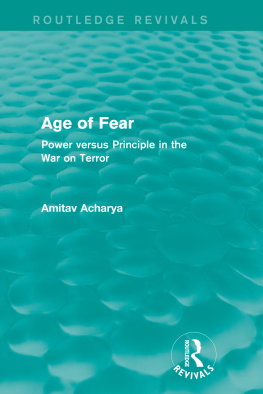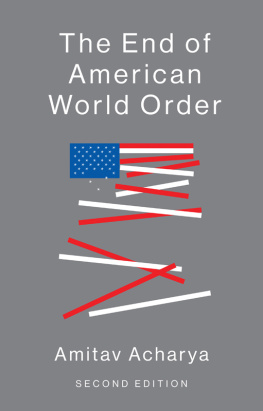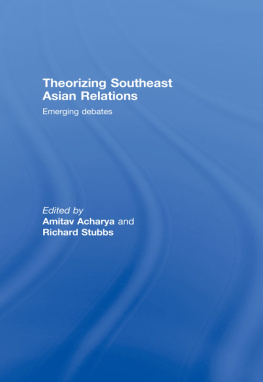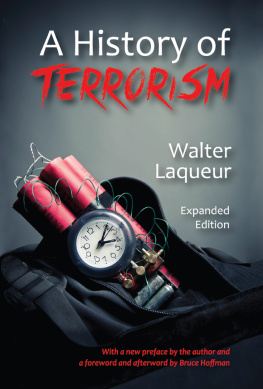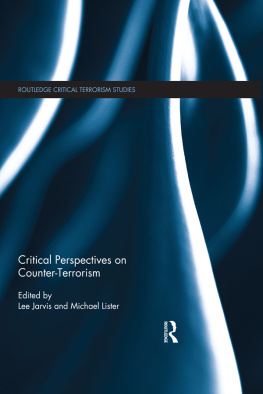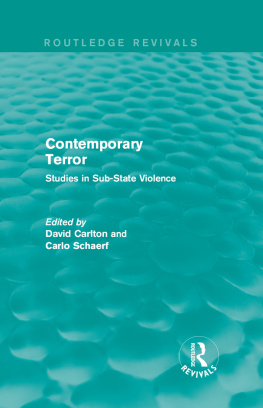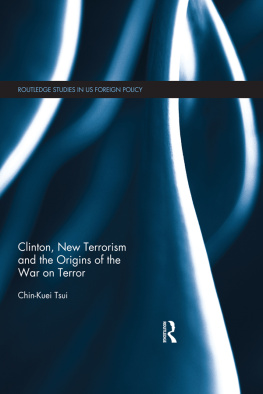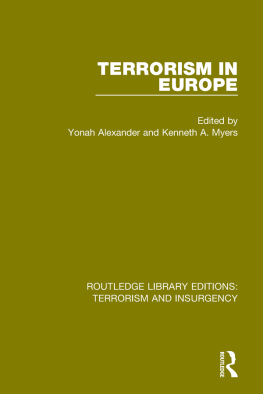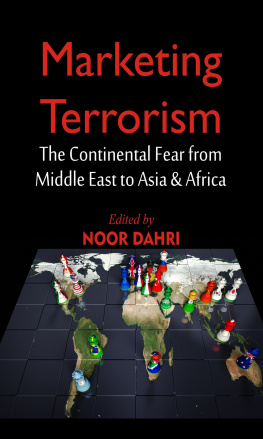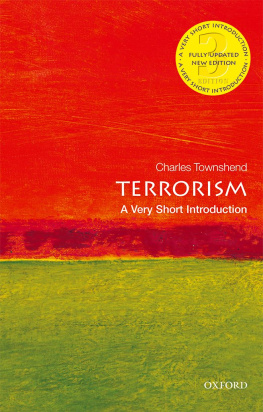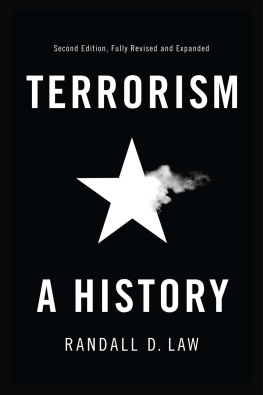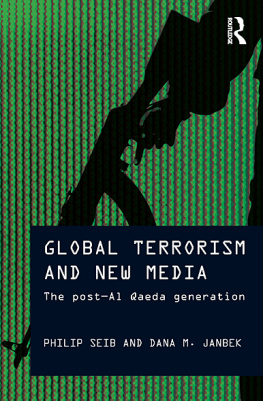Routledge Revivals
Age of Fear
First published in 2004 in the immediate wake of the September 11 terrorist attacks, this is an accessible commentary intended to provoke thought and debate on the topic of terrorism. In a collection of challenging essays, questions consider the causes of terrorism and why postmodern terrorism is different. The essays are divided into three key sections, first investigating the civilizational roots and dimensions of contemporary terrorism, next examining the Bush administrations approach, and finally, considering the complex and changing relationship between fear and freedom. Written by a leading scholar in Middle East and Asian Studies, this comprehensive reissue will be of particular value to students of international relations and terrorism studies, as well as the more general reader with an interest in the global issues faced in the age of contemporary terrorism.
Age of Fear
Power versus Principle in the War on Terror
Amitav Acharya
First published in 2004
by Marshall Cavendish Academic
This edition first published in 2014
by Routledge
2 Park Square, Milton Park, Abingdon, Oxon, OX14 4RN
Simultaneously published in the USA and Canada
by Routledge
711 Third Avenue, New York, NY 10017
Routledge is an imprint of the Taylor & Francis Group, an informa business
2004 Amitav Acharya
The right of Amitav Acharya to be identified as author of this work has been asserted by him in accordance with sections 77 and 78 of the Copyright, Designs and Patents Act 1988.
All rights reserved. No part of this book may be reprinted or reproduced or utilised in any form or by any electronic, mechanical, or other means, now known or hereafter invented, including photocopying and recording, or in any information storage or retrieval system, without permission in writing from the publishers.
Publishers Note
The publisher has gone to great lengths to ensure the quality of this reprint but points out that some imperfections in the original copies may be apparent.
Disclaimer
The publisher has made every effort to trace copyright holders and welcomes correspondence from those they have been unable to contact.
A Library of Congress record exists under LOC control number: 2005345614
ISBN 13: 978-0-415-73289-5 (hbk)
ISBN 13: 978-1-315-84881-5 (ebk)
AMITAV ACHARYA
AGE OF FEAR
POWER VERSUS PRINCIPLE IN THE WAR ON TERROR
2004 Marshall Cavendish International (Singapore) Private Limited
Published 2004 by Marshall Cavendish Academic
An imprint of Marshall Cavendish International
(Singapore) Private Limited
A member of Times Publishing Limited
Times Centre, 1 New Industrial Road,
Singapore 536196
Tel:(65) 6213 9288
Fax: (65) 6284 9772
E-mail: mca@sg.marshallcavendish.com
Website:
http://www.marshallcavendish.com/academic
All rights reserved. No part of this publication may be reproduced, stored in a retrieval system, or Iransmitted, in any form or by any means, electronic, mechanical, photocopying, recording or otherwise, without the prior permission of the publishers.
ISBN: 981-210-340-6
A CIP catalogue record for this book is available from the National Library Board (Singapore).
Printed by Times Graphics Pte Ltd, Singapore on non-acidic paper
London New York Beijing Shanghai Bangkok Kuala Lumpur Singapore
Contents
On September 11, 2001, a group of terrorists from the Middle East attacked the World Trade Center and the Pentagon. Using a novel tactic, they hijacked civilian airliners to use as missiles to crash into the huge edifices that served as the most powerful icons of American economic and military power. Two planes were used to destroy the Twin Towers of the World Trade Center, another to inflict massive damage to an entire section of the Pentagon. A fourth plane, on its way to either the US Congress or the White House, crashed in Pennsylvania when its passengers found out what was going on and struggled with the hijackers in the cockpit. Over 4,000 peoplemainly Americansdied in the attacks, especially at the World Trade Center.
This catastrophic event marked the end of the "post-Cold War era" in international relations. It has brought about a profound change in America's foreign policy and its relations with the outside world. It has led the Bush administration to launch a global war on terror centred on the Middle East and Asia, as well as on its own home front. America has embarked on a new course of foreign interventionism and global policing which the Bush administration had forsworn when it was elected into office. The administration, already no believer in multilateralism, has retreated from it even further since the September 11 attacks. Moreover, the attacks have produced the most sweeping changes in American domestic security in recent history, which other countries are emulating.
This book is my attempt to make sense of these changes.
Like all ordinary people, I am in mortal fear of terrorists, especially since September 11, 2001. Every time I board a plane, or step into a pub in Holland Village in Singapore, Bangsar in Kuala Lumpur, or Sukhumvit in Bangkok, or walk the wonderfully chaotic streets of Bangkok, Jakarta and Delhi, I wonder whether I could be a victim of the next terrorist attack. I was saddened, frightened and angered by the September 11 attacks on the United States. I strongly supported the US led war to oust the Taliban regime in Afghanistan and felt compelled to write an op-ed (published in the International Herald Tribune and included in this volume) to dismiss the view that this war (not Iraq) would spark a clash of civilizations against America. I have zero sympathy for terrorists, no matter where they come from, how valid their cause, and how righteous their anger. I make absolutely no apologies for any groupHindus, Muslims, Christians, Palestinians, Tamils, Afghans, and Irishthat kills innocent citizens, under whatever pretext. I expect and hope that governments, in cooperation with their own citizens and the international community, will do their best to eradicate the menace of international terrorism. In this endeavour, they deserve the support of all peace-loving and justice-seeking people.
But every concerned person has a right to know a few basic truths about the "war on terror" and ask whether the way the war is being conducted by the United States and its allies is necessarily the best and the only way to defeat the threat.
Terrorism, especially the possibility of terrorists using weapons of mass destruction is a grave danger. But is terrorism the most serious threat to humankind in "our time" as some Bush administration officials put it? Millions of people fall victim every day to other sources of insecurity, including hunger, disease and repression, and not just in the so-called Third World. I find it hard to accept the claim that poverty, humiliation and lack of democracy have less to do with terrorism, compared to, say, Islamic ideology or Al-Qaeda.
Having followed closely the way the Bush administration justified and conducted the war against Iraq, and the subsequent failure of coalition forces to uncover any weapons of mass destruction in Iraq, one would have less faith in a government's ability to tell the truth about the need for military action in the name of fighting terror. One is not sure if the Bush administration, or some of its allies, are really above using the war on terror for political advantage. I believe a different Republican president, or a Democrat, might have handled the threat posed by terrorism with more nuance and in a manner less damaging to international order. I fear that even after the Iraqi intelligence fiasco, governments will still be tempted to manipulate intelligence information and exploit the public's concern with terrorism to push for political goals that have little to do with terrorism. The Saddam regime was heinous and deserving of being overthrown through foreign military intervention. But any such intervention should and could have been undertaken collectively after the UN inspectors had a further chance to conduct their investigations. Does the timing of the war and the manner of its organization, whatever the aggravation, justify the serious long-term damage to international order that resulted from it?

